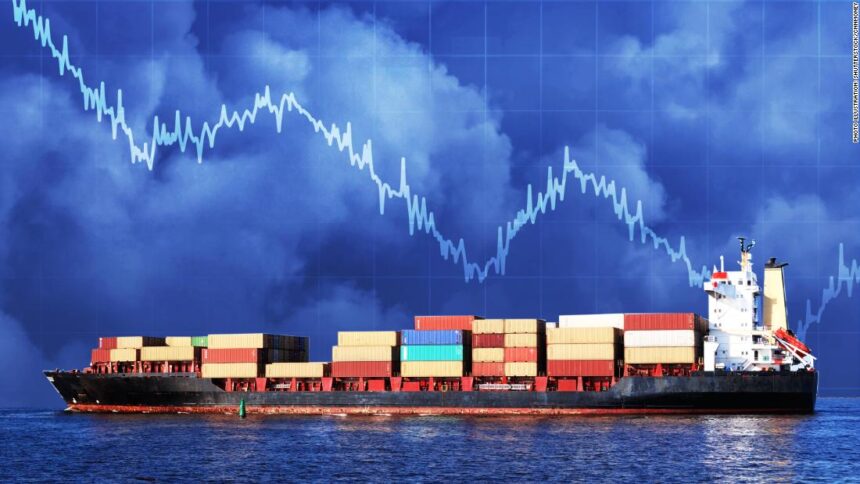The International Monetary Fund (IMF) has issued a stark warning about the global economic growth, predicting slower growth and heightened inflation, particularly in the U.S. This follows the aggressive tariff policies introduced by President Donald Trump, which have set off a wave of economic disruptions worldwide. The IMF’s latest projections, released this Tuesday, show a worrying trend of economic slowdown, with the U.S. at the center of the storm.
U.S. Economic Slowdown as a Result of Aggressive Tariff Policies
The IMF’s World Economic growth report forecasts that global economic output will decelerate to 2.8 percent this year, down from 3.3 percent in 2024. The primary contributor to this decline is the ongoing trade war, with the U.S. imposing hefty tariffs on imports, including a 10 percent levy on nearly all goods and 145 percent tariffs on Chinese products. The repercussions of these trade barriers are expected to severely impact U.S. economic performance, which was already on track to slow down.
The IMF now projects U.S. economic growth to decelerate to 1.8 percent in 2025, down from 2.8 percent the previous year. This downgrade is significant, as it marks a stark difference from the 2.7 percent growth forecasted earlier this year. According to Pierre-Olivier Gourinchas, IMF’s Chief Economist, the U.S. tariff rate has surpassed historical levels not seen since the turn of the 20th century. The aggressive trade policies have exacerbated uncertainty, stalling U.S. companies that rely on international trade, particularly those that export goods or import components for manufacturing.
You may also like: IMF Sees True World Economy Slowing Thanks to USA Tariff Policies and Trade Talks
Global Impact and Retaliatory Measures from Key Economies
While the U.S. bears the brunt of the economic growth consequences, other major global players are not immune. China, Canada, and the European Union have retaliated against U.S. tariffs, with China imposing its own set of trade barriers. The European Union has also warned of escalating its tariffs if the U.S. proceeds with a planned 20 percent tax. The IMF’s report acknowledges the risks that such retaliatory measures pose to global trade, further complicating the international economic landscape.
The IMF’s forecasts for China and Europe have also been revised downward, though fiscal support from their respective governments may help soften the economic impact. However, the ongoing trade war between the U.S. and China remains a significant risk factor, with the two largest economies locked in a prolonged standoff. This uncertainty is expected to persist unless a trade deal is reached, which could weigh on global growth for the foreseeable future.
Inflationary Pressures and the Increased Risk of Recession
Another consequence of the trade war is the mounting inflationary pressures in the U.S. The IMF has raised its inflation forecast for the country to 3 percent for the year, up from a previous estimate of 2 percent. While some of the price increases triggered by tariffs may be temporary, the reduction in U.S. productivity and output is expected to be permanent. Though the IMF does not project an outright recession in the U.S., the probability of a downturn has increased to 40 percent, a significant jump from the 25 percent likelihood forecasted last October.
This rising inflation is a direct result of tariff-induced price hikes, particularly in consumer goods. At the same time, the broader economic environment, characterized by increased policy uncertainty and reduced global trade, is putting further strain on the system. For emerging markets and developing economies, the situation is even more precarious, with these nations facing higher risks due to their limited financial buffers.
Read: U.S.-China Trade: Trump Signals Tariff Rollback Amid Market Turmoil
Trade Uncertainty and Global Resilience
Despite the grim projections, the IMF remains cautious in its predictions, acknowledging that many variables remain at play. The Trump administration has delayed some of its tariff policies and is actively working to secure bilateral trade deals with multiple countries, which could ease some of the economic growth pressure. However, any further escalation in trade tensions or tariff increases would pose significant risks to global productivity and growth, particularly for developing economies.
As the trade war continues, the IMF has emphasized the importance of maintaining central bank independence to preserve economic stability. The ongoing saga of U.S.-China trade negotiations will be a key factor in shaping the global economy in the coming years. Until a resolution is found, the uncertainty surrounding international trade is likely to remain a major hurdle for global growth.
In The End
The IMF’s latest report paints a somber picture for the global economic growth, highlighting the profound impact of President Trump’s trade policies. With growth forecasts downgraded and inflationary pressures on the rise, the world’s largest economies are facing a challenging road ahead.
For more business news like this follow 10X Times.






